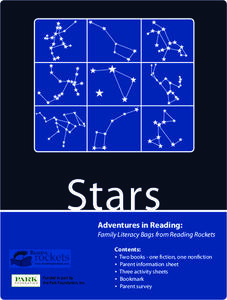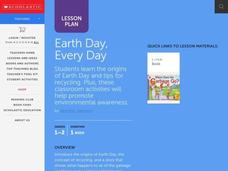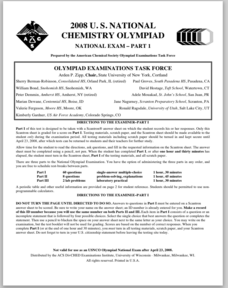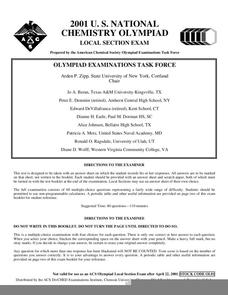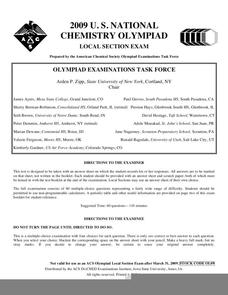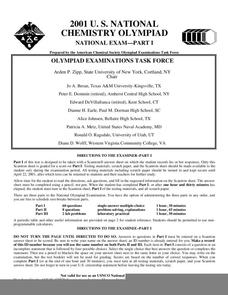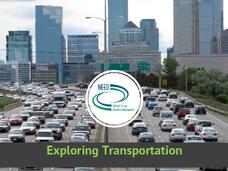Curated OER
Connection to Social Studies: Linus Pauling: A Life Well Spent
In this atomic energy worksheet, students read about Linus Pauling, who spent years making the public aware of the dangers of nuclear weapons. They answer questions about his work and the social responsibility he took on which led to the...
National Wildlife Federation
Quantifying Land Changes Over Time Using Landsat
"Humans have become a geologic agent comparable to erosion and [volcanic] eruptions ..." Paul J. Crutzen, a Nobel Prize-winning atmospheric chemist. Using Landsat imagery, scholars create a grid showing land use type, such as urban,...
PBS
Reading Adventure Pack: Stars
A Reading Adventure Pack explores the night sky. Reading Her Seven Brothers by Paul Goble and Find the Constellations by H.A. Rey begin the learning experience. Scholars craft a night sky mobile, go stargazing, and write a mythical story...
Virginia Racing Commission
Project Hoofbeat: Incorporating the Horse in the Classroom:
It's all about horses in this cross-curricular packet that includes everything equine from United States horse history, breeds, grooming tools, and plenty of new vocabulary terms. Split into 11 lessons, learners complete crossword...
Curated OER
Microclimates of Our School
Students read the story "Weslandia" by Paul Fleischman, define the term microclimate, gather and record data in various places on school grounds to establish the presence of difference microclimates, analyze and compare microclimates,...
Curated OER
Earth Day, Every Day
First graders celebrate Earth Day. In this Earth Day lesson, 1st graders listen to a book Where Does the Garbage Go? by Paul Showers, and list facts about the garbage we throw away. Students use the Think-Pair-Share method.
Curated OER
Who Wants to Be a Thrillionaire?
Students explore the investments undertaken by the "thrillionaire" Paul G. Allen, and propose future areas of high-tech scientific investment for Mr. Allen to pursue.
Curated OER
Time Train
Students are read a short book "Time Train" by Paul Fleischman. Using the text, they identify the clues to let them know the train is traveling back in time. They make a time line of the trip and make a cutout of meat-eating and...
Curated OER
ATP PRODUCTION
Students study four different types of ATP production and the important role it plays in normal everyday production, where ATP is formed. They will explore the role, functions and conditions that ATP is produced.
Curated OER
Genetic Testing: Road Map or Crystal Ball?
After looking at the many aspects of the issues behind genetic testing, students are exposed to the pros and cons and must take a stand by writing a position paper. They will view the "Who Gets to Know?" video and/or reading case studies...
Curated OER
2008 U.S. National Chemistry Olympiad Part I
In this chemistry Olympiad worksheet, students solve sixty multiple choice questions on a variety of chemistry topics from finding molarity of solutions to calculating products of reactions. Students are given graphs, equations, reaction...
Curated OER
2008 U.S. National Chemistry Olympiad Part III
In this chemistry olympiad lab worksheet, chemists are required to design two experiments. In one, they design an experiment to identify seven solutions given to them in pipettes. In the other, they design an experiment to determine the...
Curated OER
2009 U.S. National Chemistry Olympiad National Exam - Part I
The 2009 version of the first part of a national chemistry competition is posted for your use with olympiad hopefuls. Test takers deal with 60 multiple choice questions covering an entire year of chemistry curriculum. Use this to...
Curated OER
2001 U.S. National Chemistry Olympiad - Local Section Exam
Sixty multiple-choice chemistry questions make up this comprehensive exam used for the 2001 US National Chemistry Olympiad. Every topic that you would expect to approach in a general chemistry class is queried on. You could easily use...
Curated OER
2009 U. S. National Chemistry Olympiad - Local Section Exam
Here is a copy of a past national challenge exam that you can use in your general chemistry course as a unit or semester review. Sixty multiple-choice questions query learners on properties of matter, stoichiometry, reactions, and...
Curated OER
2001 U.S. National Chemistry Olympiad Part I
Sixty multiple-choice questions test on a variety of first year chemistry subjects. In order to succeed, exam takers must be competent with properties of elements, stoichiometry problems, gas laws, bond dissociation, and types of...
Curated OER
2001 U.S. National Chemistry Olympiad National Exam Part II
Only eight problems are on this competitive national chemistry exam. It required the balancing of chemical equations, solving stoichiometry questions, and more. This is part two of three of the national exam. Also available is a local...
Curated OER
2002 U.S. National Chemistry Olympiad National Exam - Part I
As to be expected from the American Chemical Society Olympiad Examinations Task Force, this 60-question test tops the charts in terms of excellence. It consists entirely of multiple choice questions designed to assess a year's worth of...
Government of South Australia
Don't Waste Your Energy
Don't lift another finger, this physical and environmental science unit has everything you need to begin teaching your class about energy. Starting with a look at the greenhouse effect, these lessons and activities take young scientists...
Intel
Insects: The Good, The Bad, The Ugly
What would the world be like with no insects? Ponder this question using a research-based STEM unit that encourages scholars to investigate insects from both a beneficial and hazardous perspective. They learn about insect behaviors,...
Science 4 Inquiry
Carbon and Climate
The carbon cycle is natural and has happened for millions of years, so can humans change it? Young scientists play the role of carbon as they travel through the carbon cycle. They complete two rounds, once before the industrial...
It's About Time
Factors Affecting Population Size
How do we predict future population growth? Young researchers investigate various factors affecting the size of our population. As they calculate and interpret graphs to determine factors that could potentially affect increases and...
Rainforest Alliance
Sounds of the Rainforest
Do you hear what I hear? Encourage scholars to use their listening skills and participate in a series of activities that demonstrate how the sense of hearing is crucial to the human and animal world. Activities guide learners on nature...
National Energy Education Development Project
Exploring Transportation
Did you know horsepower is actually based on the power of a horse? 60 horse power is the equivalent of being pulled by a team of 60 horses! Viewers will learn other interesting facts like this from a presentation that begins with the...




